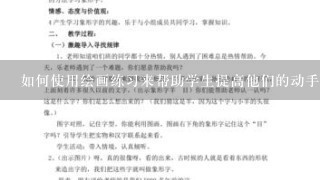如何使用绘画练习来帮助学生提高他们的动手能力?

Answer:
How to Use Painting Exercises to Enhance Hand-Eye Coordination and Creativity
1. Choose Simple Materials:
- Start with basic materials like crayons, pencils, or paintbrushes.
- Avoid complex or intricate tools that may overwhelm young artists.
2. Start with Basic Shapes:
- Encourage students to draw simple shapes like circles, squares, and triangles.
- Gradually introduce more complex shapes as their skills improve.
3. Encourage Experimentation:
- Allow students to explore different colors, textures, and techniques.
- Provide inspiration by showing examples of paintings with different styles and techniques.
4. Provide Feedback and Guidance:
- Offer constructive feedback on their progress and areas for improvement.
- Guide students with simple instructions and step-by-step instructions.
5. Encourage Collaboration:
- Have students work in pairs or small groups to create paintings together.
- This promotes teamwork, communication, and sharing of ideas.
6. Use Everyday Objects:
- Encourage students to draw objects they find around the classroom or home.
- This provides a familiar and relatable context for learning.
7. Make it Fun and Engaging:
- Use games, challenges, or storytelling to make painting sessions more enjoyable.
- Encourage students to express themselves and explore their creativity.
8. Promote Hand-Eye Coordination:
- Use exercises like finger painting, dot-to-dot paintings, and mosaic work to improve fine motor skills.
- Encourage students to use both hands in different ways.
9. Encourage Creativity:
- Provide students with a wide range of materials and allow them to express themselves freely.
- Encourage them to experiment with different techniques and ideas.
10. Foster Self-Confidence:
- Celebrate students' progress and achievements.
- Provide positive feedback and encouragement to build their confidence.
Additional Tips:
- Start with short and manageable sessions.
- Break down complex tasks into smaller steps.
- Provide opportunities for students to self-evaluate and adjust their approach.
- Encourage students to reflect on their learning and make connections to their own experiences.

































































